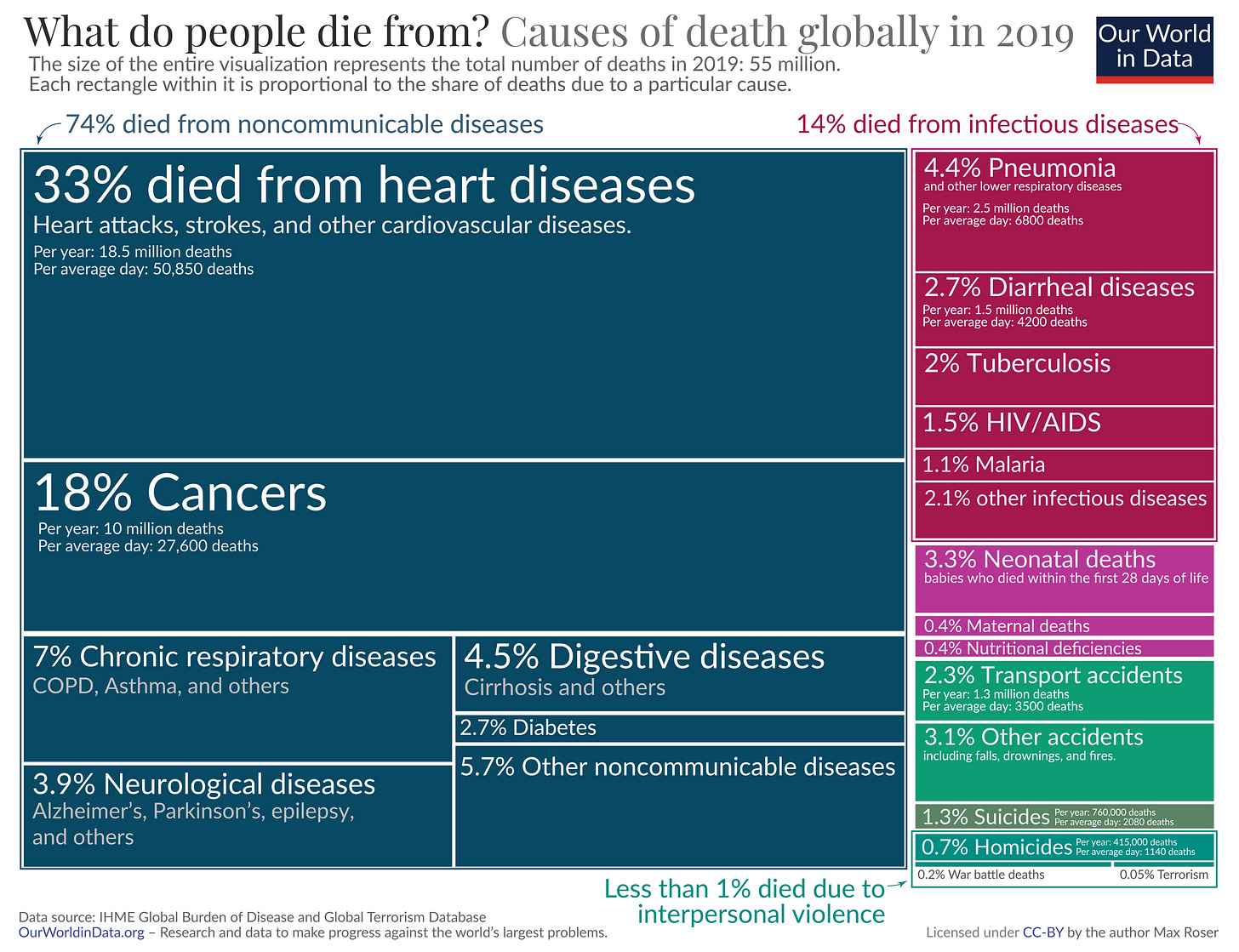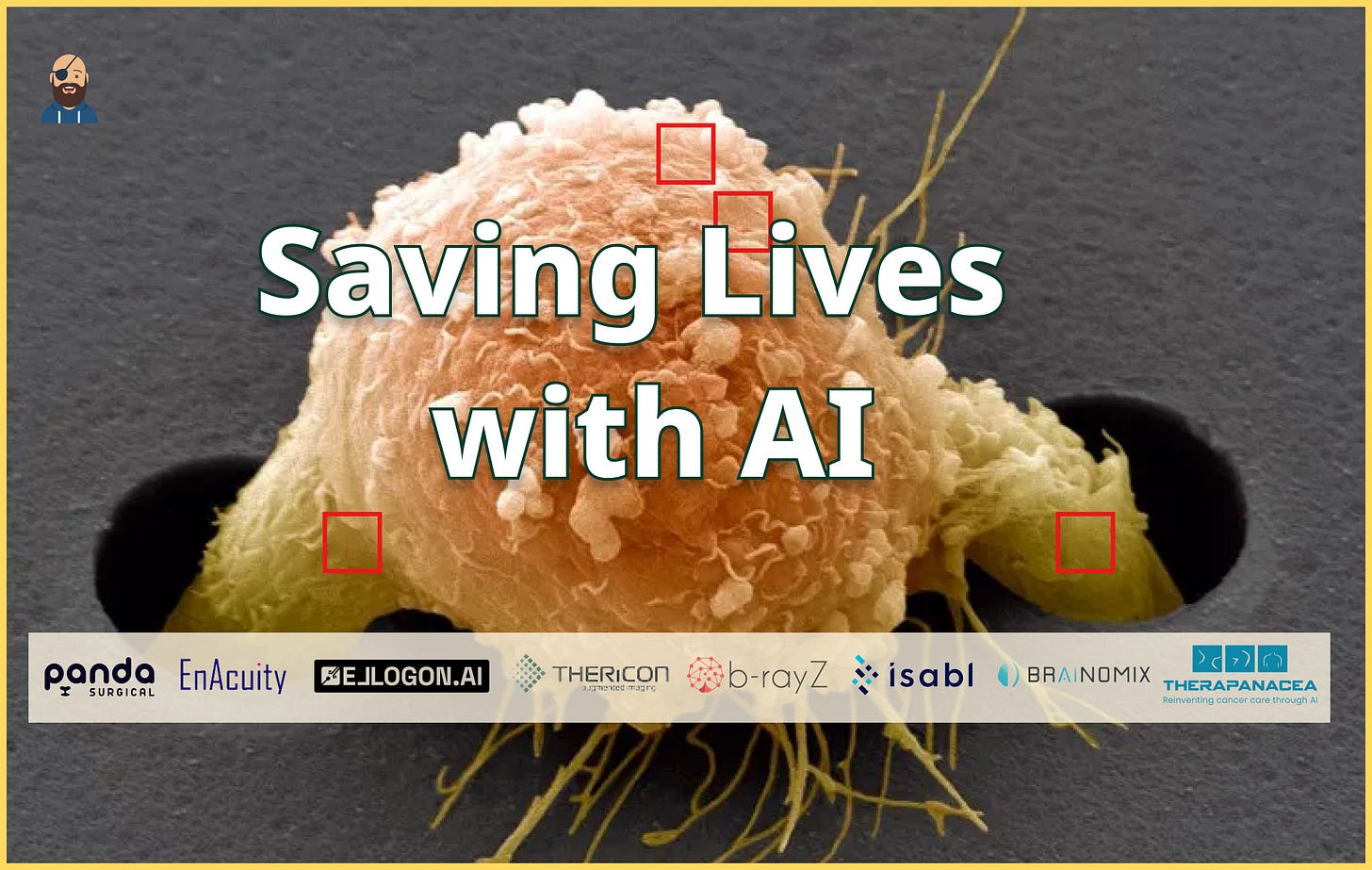Saving Lives with AI
AI startups & the quest to fight cancer, design for Product Managers, startup to exit, jobs, events, and more
This is Startup Pirate #99, a writing about technology, entrepreneurship, and startups every two weeks. Made in Greece. If you haven’t subscribed, join 6,130 readers by clicking below:
Saving Lives with AI
As it stands, cancer is the second-leading cause of death globally, behind heart disease. One of the “four horsemen of chronic disease”.
It’s impossible to talk about it without realising everybody’s life has been touched by it either directly or indirectly. All of us know people who have, have had or have died from cancer. A Global Burden of Disease study estimates that roughly 10 million people died from it in 2019, and one out of six deaths worldwide were from cancer. We have made important progress in understanding and treating the disease, yet the number of deaths due to cancer is on the rise (an increase of ~ 75% between 1990 and 2019).
Cancer follows a large age gradient. Older people are much more likely to have it and our societies — particularly in the West — are rapidly ageing (health improving, fertility rates falling, etc.). Yet, recent research (study1, study2, study3) spotlights a troubling trend: a rise in early-onset cancers in people younger than 45 or 50.
We need earlier and better prevention, screening, and treatment. We need more skills, resources, and powers towards that goal — an endeavour at the top of Good & Hard Quests. These future-defining problems are hard to recruit for, difficult to raise money for, and nearly impossible to build near-term businesses around, which is why we need mission-driven people pursuing.
Now, different studies point to AI's potential to fill in the gaps and pull signals from noise in cancer care. I don’t think AI will fully replace doctors, but it will certainly make the best doctors even better at their jobs. Last month, Nature published a study in which AI outperformed pathologists at identifying the origins of metastatic cancer cells that circulate in the body. More such impressive accomplishments have recently made the headlines.
To understand the latest progress, I dug into the technology eight teams with Greek founders are developing to help doctors screen and treat patients and tackle one of humanity’s most important quests. The list below is indicative — it’s fantastic to see many more funnelling their energy into this arena.
Let’s get to it.
Panda Surgical
Mission: Revolutionise neurosurgery
Founders: Manios Dimitrakakis, Danail Stoyanov, Hani Marcus
Spin-off: University College London
To remove tumours and abnormalities within the brain and spine, surgeons have introduced minimally invasive approaches which are less risky than open neurosurgery with decreased morbidity, faster patient recovery, and no visible scarring. However, these advanced neurosurgical methods are limited to specialised centres, reducing patient access and straining hospitals with referral and readmission costs.
Panda Surgical uses robotics and AI to develop a next-gen handheld platform that offers neurosurgeons enhanced dexterity and control in confined spaces. This enables more surgeons to perform complex, minimally invasive procedures, reach previously unattainable areas, and perform delicate manoeuvres safely and precisely.
EnAcuity
Mission: Perform safer laparoscopies
Founders: Maria Leiloglou, Tobias Czempiel, Dan Stoyanov, Dan Elson
Spin-off: University College London, Imperial College London
Laparoscopies are minimally invasive surgeries performed on the abdomen using small incisions and a thin tube with a video camera. Traditionally, the cameras reproduce on screen what the surgeon would see if they were performing open surgery. This makes the detection of certain pathologies and surgical structures of interest, such as vessels and nerves, difficult, partly because the human eye is not sensitive enough to pick up on the subtle colour differences that distinguish them.
EnAcuity augments surgical vision with AI spectral imaging. They do this via a camera-agnostic hyperspectral imaging solution that highlights functional information in the body that is hard for the eye to detect, improving outcomes for surgeons and patients.
Ellogon AI
Mission: Personalise immunotherapy
Founders: Efstratios Gavves, Evangelos Kanoulas
Spin-off: University of Amsterdam
Immunotherapy is a treatment that helps the immune system fight cancer. Despite its benefits, selecting patient candidates for immunotherapy is challenging and complex due to the large number of different cells that medical experts have to assess from patients’ tissues using a microscope. Additionally, immunotherapy is very expensive, so selecting the right candidates for treatment is critical.
Ellogon AI accurately quantifies immunogram biomarkers using AI, assisting medical experts throughout the candidate selection process. It informs the pathologist of the specific biomarkers per individual patient, thus enabling personalised medicine, enhancing patient outcomes, and reducing the economic burden on national healthcare systems.
Thericon
Mission: Improve the success of surgeries
Founders: Nikolaos Deliolanis, Bartek Grychtol
Spin-off: Heidelberg University
Approximately 200,000 people die every year due to bladder cancer, and every year, out of 600,000 surgical cancer resections, there are 300,000 recurrences in the US and Europe. This happens partly because a visual image of bladder tumours requires ample experience for interpretation. Especially small tumours are difficult to identify, resulting in false negative interpretations in ~20% of cases.
Thericon provides an endoscopy system using AI-powered multiparametric imaging, delivering more accurate information during the surgical procedure. This allows for displaying previously invisible tissue properties together with standard colour images on a single screen and can be applied in different settings, including bladder endoscopy, neurosurgery, and laparoscopic surgery.
b-rayZ
Mission: Augment radiology
Founders: Alexander Ciritsis, Andreas Boss, Cristina Rossi
Spin-off: University Hospital Zurich
With over 2.3 million new cases and 685,000 deaths in 2020, breast cancer is the most commonly diagnosed cancer worldwide. Low image quality and inadequate diagnostic for dense breast significantly reduces the capability of radiologists to diagnose breast cancer at very early signs.
b-rayZ has developed an AI platform that supports the daily work of radiologists in mammography during the evaluation of image quality and breast density in real-time. The system empowers breast cancer detection and diagnostic accuracy by providing insights and highlighting potential areas of concern.
Isabl
Mission: Empower precision oncology with one comprehensive test
Founders: Elli Papaemmanuil, Andrew Kung, Juan Medina
Spin-off: Memorial Sloan Kettering Cancer Center
Genomic profiling of tumour biopsies has revolutionised cancer care by better understanding mutated genes, classifying the disease, and supporting treatment decisions. However, current tests typically detect only a few frequently mutated genes, leaving many patients — especially those with less common cancers — without clinically relevant findings and limited treatment options.
Isabl analyses the entire tumour genome and transcriptome, revealing and identifying relevant cancer-associated mutations in every sample. Applying AI to precision medicine, Isabl’s technology aims to unlock the full potential of genomic medicine, offering a significant step in tailored care.
Brainomix
Mission: AI-powered imaging biomarkers for precision medicine
Founders: Michalis Papadakis, Andrew Barker
Spin-off: University of Oxford
Annually, 15 million people worldwide suffer a stroke. It’s no coincidence that the best-known acronym for spotting signs of a stroke urges FAST action. Every second counts, not least for the clinicians making crucial decisions about diagnosis and treatment.
Brainomix analyses images from simple CT scans using AI and provides detailed real-time information on the extent and nature of brain damage, helping doctors make quick, accurate decisions. This reduces arrival-to-discharge times by more than one hour and triples the number of patients who achieve functional independence. The company has developed similar AI imaging for lung disease and cancer.
TheraPanacea
Mission: Reinventing cancer care through AI
Founders: Nikos Paragios, Catherine Martineau-Huynh, Rafael Silva
Spin-off: University Paris-Saclay
Radiation therapy is typically done manually by the doctor through CT scan processing. Although the radiation targets cancer cells in order to eliminate them, it also destroys everything in its path, including sometimes healthy organs, which are known as organs at risk.
TheraPanacea has developed a suite for radio-oncology that builds a digital model of the type and shape of the tumour to be treated and optimises the management of radiation to avoid healthy cells and nearby organs. Additionally, it enables MRI-guided radiotherapy (instead of CT scans), reducing the toxicity of X-rays on the body and providing further information on the tumour’s behaviour.
Jobs
Check out job openings here from startups hiring in Greece.
News
Shipping logistics Harbor Lab raised $16m Series A led by Atomico. I recently chatted with Antonis Malaxianakis on the newsletter — jump here to learn more.
Infinite Orbits raised €12m to extend the lifespan of satellites. You can learn more about the technology they develop here.
Decentralised weather network WeatherXM secured $7.7m Series A led by Lightspeed Faction. Another old friend of this newsletter :)
Acumino raised a $6.5m Seed led by Big Pi Ventures to develop General Robotic Intelligence and enable robots to perform complex tasks.
Apeiron Venture Capital launched with a size of €25m to invest in early-stage Greek and European startups with emphasis on Gen Z and B2B software.
FINNY announced a Pre-Seed round and entering Y Combinator (YC S24) to help financial advisors grow.
Donation platform Givelink secured Pre-Seed funding.
European Investment Fund to support Greek startups in life sciences, health, and sustainability with €200m new equity financing through EquiFund II.
Resources
Journey from starting up to exit with George Varvarelis, co-founder of Augmenta.
Building a better future with AI from Michael Petychakis, CTO at Orfium.
Joseph Alvertis, VP of Product at TileDB, discusses how Product Managers can develop basic design skills.
How AI is disrupting healthcare with Dimitrios Skaltsas, co-founder & CEO at Intelligencia AI.
Startups, entrepreneurship and brain drain with Dimitris Tsigos, founder & CEO at Starttech Ventures.
Seamless image delivery with Airtable, Vercel and Cloudflare from Nikos Benakis, Senior Software Engineer at Uizard.
Events
If you’re in Athens, join us at Open Coffee Athens #118 on May 31
2nd Social Innovation Hackathon UoM on May 24-25
Site Reliability Engineering and Non-tech lessons learned by Patras Tech Talk on May 28
AI and Beers - Athens #5 on May 29
UX Greece welcomes Jeff Sauro on Jun 4
That’s all for this week. Tap the heart ❤️ below if you liked this piece — it helps me understand which themes you like best and what I should do more.
Find me on LinkedIn or Twitter.
Thank you so much for reading,
Alex








Great summary of top life-saving AI companies with Greek genes. Kudos!